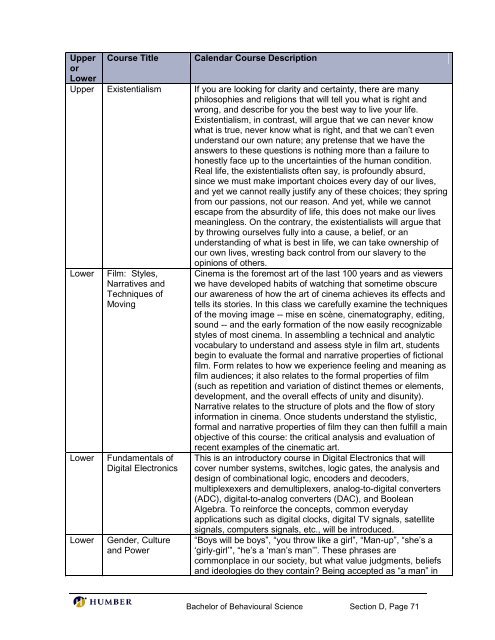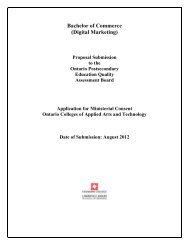Bachelor of Behavioural Science - Postsecondary Education Quality ...
Bachelor of Behavioural Science - Postsecondary Education Quality ...
Bachelor of Behavioural Science - Postsecondary Education Quality ...
You also want an ePaper? Increase the reach of your titles
YUMPU automatically turns print PDFs into web optimized ePapers that Google loves.
Upper Course Title Calendar Course Description<br />
or<br />
Lower<br />
Upper Existentialism If you are looking for clarity and certainty, there are many<br />
philosophies and religions that will tell you what is right and<br />
wrong, and describe for you the best way to live your life.<br />
Existentialism, in contrast, will argue that we can never know<br />
what is true, never know what is right, and that we can‘t even<br />
understand our own nature; any pretense that we have the<br />
answers to these questions is nothing more than a failure to<br />
honestly face up to the uncertainties <strong>of</strong> the human condition.<br />
Real life, the existentialists <strong>of</strong>ten say, is pr<strong>of</strong>oundly absurd,<br />
since we must make important choices every day <strong>of</strong> our lives,<br />
and yet we cannot really justify any <strong>of</strong> these choices; they spring<br />
from our passions, not our reason. And yet, while we cannot<br />
escape from the absurdity <strong>of</strong> life, this does not make our lives<br />
meaningless. On the contrary, the existentialists will argue that<br />
by throwing ourselves fully into a cause, a belief, or an<br />
understanding <strong>of</strong> what is best in life, we can take ownership <strong>of</strong><br />
our own lives, wresting back control from our slavery to the<br />
Lower<br />
Lower<br />
Lower<br />
Film: Styles,<br />
Narratives and<br />
Techniques <strong>of</strong><br />
Moving<br />
Fundamentals <strong>of</strong><br />
Digital Electronics<br />
Gender, Culture<br />
and Power<br />
opinions <strong>of</strong> others.<br />
Cinema is the foremost art <strong>of</strong> the last 100 years and as viewers<br />
we have developed habits <strong>of</strong> watching that sometime obscure<br />
our awareness <strong>of</strong> how the art <strong>of</strong> cinema achieves its effects and<br />
tells its stories. In this class we carefully examine the techniques<br />
<strong>of</strong> the moving image -- mise en scène, cinematography, editing,<br />
sound -- and the early formation <strong>of</strong> the now easily recognizable<br />
styles <strong>of</strong> most cinema. In assembling a technical and analytic<br />
vocabulary to understand and assess style in film art, students<br />
begin to evaluate the formal and narrative properties <strong>of</strong> fictional<br />
film. Form relates to how we experience feeling and meaning as<br />
film audiences; it also relates to the formal properties <strong>of</strong> film<br />
(such as repetition and variation <strong>of</strong> distinct themes or elements,<br />
development, and the overall effects <strong>of</strong> unity and disunity).<br />
Narrative relates to the structure <strong>of</strong> plots and the flow <strong>of</strong> story<br />
information in cinema. Once students understand the stylistic,<br />
formal and narrative properties <strong>of</strong> film they can then fulfill a main<br />
objective <strong>of</strong> this course: the critical analysis and evaluation <strong>of</strong><br />
recent examples <strong>of</strong> the cinematic art.<br />
This is an introductory course in Digital Electronics that will<br />
cover number systems, switches, logic gates, the analysis and<br />
design <strong>of</strong> combinational logic, encoders and decoders,<br />
multiplexexers and demultiplexers, analog-to-digital converters<br />
(ADC), digital-to-analog converters (DAC), and Boolean<br />
Algebra. To reinforce the concepts, common everyday<br />
applications such as digital clocks, digital TV signals, satellite<br />
signals, computers signals, etc., will be introduced.<br />
―Boys will be boys‖, ―you throw like a girl‖, ―Man-up‖, ―she‘s a<br />
‗girly-girl‘‖, ―he‘s a ‗man‘s man‘‖. These phrases are<br />
commonplace in our society, but what value judgments, beliefs<br />
and ideologies do they contain Being accepted as ―a man‖ in<br />
<strong>Bachelor</strong> <strong>of</strong> <strong>Behavioural</strong> <strong>Science</strong> Section D, Page 71
















